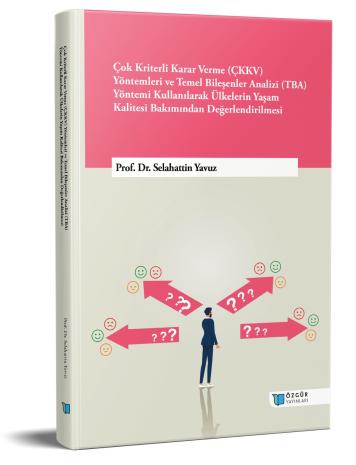
Çok Kriterli Karar Verme (ÇKKV) Yöntemleri ve Temel Bileşenler Analizi (TBA) Yöntemi Kullanılarak Ülkelerin Yaşam Kalitesi Bakımından Değerlendirilmesi
İndir
Özet
Yaşam kalitesi fertlerin ve toplumların genel refah düzeyini belirleyen çok yönlü bir kavramdır. Sözkonusu bu kavram fertlerin ve toplumların maddi imkânlarıyla sınırlı olmayıp diğer birçok faktörle açıklanabilmektedir. Yaşam kalitesi bireylerin günlük yaşamlarını ve toplumların genel refahını doğrudan etkilemektedir. Bu sebepten dolayı fertlerin ve dolayısıyla toplumların yaşam kalitesini arttırmaya yönelik politikalar belirlemek ve stratejiler geliştirmek oldukça önemlidir. Yaşam kalitesinin ölçülmesi, hem nesnel hem de öznel boyutları içeren bir süreçtir. Ülkelerin yaşam kalitesi, birçok faktöre bağlı olarak değerlendirilir ve farklı göstergelerle ölçülür.
Bu çalışmada Çok Kriterli Karar Verme (ÇKKV) Yöntemleri ve Temel Bileşenler Analizi (TBA) yöntemi kullanılarak ülkeler yaşam kalitesi bakımından değerlendirilmiştir. Ülkelerin yaşam kalitesi bakımından değerlendirilmesi amacıyla belirlenen kriterler; Satın Alma Gücü, Güvenlik, Sağlık Hizmeti, İklim, Yaşam Maliyeti, Emlak Fiyatının Gelire Oranı, Trafikte Geçen Zaman, Kirlilik, Ortalama Okullaşama Yılı, İnsani Özgürlük, Demokrasi şeklindedir. Belirlenmiş olan kriterlerin ağırlıklandırılmasında ENTROPI ve CRITIC Yöntem ayrı ayrı kullanılmıştır. ENTROPI ve CRITIC Yöntemle ağırlıklandırılan kriterler; Çok Kriterli Karar Verme Yöntemlerinden olan ARAS, COPRAS, EDAS, MABAC, TOPSİS ve MOORA Yöntemleri ile birlikte kullanılarak belirlenen ülkeler yaşam kalitesi bakımından sıralanmıştır. Ayrıca, yaşam kalitesi için belirlenen kriterler Temel Bileşenler Analizi Yönteminde kullanılarak ülkeler yaşam kalitesi bakımından sıralanmıştır. En sonunda, her iki yöntem (ÇKKV ve TBA) ile elde edilen sırlamalar karşılaştırılmıştır.

